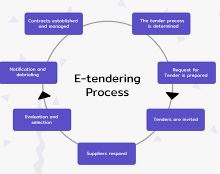11 Common Serious Mistakes in Tender
In earlier article Dr. Lalit Kumar explained how to open, evaluate, and award a tender.
Further, he has written this article, we thanks him for giving such good write-up for publication.
The procurement of goods and services is generally noticed as an area
of financial irregularities and embezzlement. Keeping in view, the Government
launched Government e-Marketplace (GeM) for ensuring transparency and making
officers directly accountable. The e-Procurement portal is also launched to
ensure the proper procedure of the tendering. In this article, we will go
through the common mistakes usually committed during the procurement. The award
of tender is a lengthy process and requires sincerity at each level:
(i) Availability of sanctions:
The tender process comprises two rounds, technical round and financial
round. For both rounds, the technical and financial sanction of competent
authority is required. Whatever terms and conditions are provided in the tender
document, required to be approved by the Competent Authority. It is required to
get approvals otherwise it will be a mistake and audit objection can be raised.
(ii) Adequate Publicity:
The procuring authorities required to ensure the competition among the
bidders and for this purpose, adequate and wide publicity is required.
Advertisement is posted on website and tender documents are uploaded on
e-procurement portal. It is required to ensure the adequate publicity otherwise
it will be treated as serious mistake audit objection can easily be raised.
(iii) Enough Time for each step of Tender:
The tender is lengthy process and accordingly, the enough time should be
provided for receiving the bids, opening tender after receiving of bids,
addressing the bidders and inviting time to be present during the award of
tender etc. In case, there is not enough time for any particular step, all
process will seam biased and audit objection can easily be raised for the
mistake.
(iv) Establishment of Panel in Limited Tender:
Generally, limited tender is preferred to avoid the delay in procurement
of goods and services. In such circumstances, a panel is established for enrolment
of vendors, contractors, and service providers. The terms and conditions for enrolment
should be transparent and clearly explained on the website. The eligibility
criteria should not be biased and the panel should be updated at regular
intervals keeping in view the enrolment of new vendors. In case, panel is not
established and updated at regular interval, it will be treated as serious
mistake because it will restrict the competition in procurement.
(v) No Deviation in Criteria during Evaluating Bids:
The tender document contains the criteria on which basis the bids are
evaluated. The criteria are conveyed to all bidders through the tender document
and during the evaluation of technical and financial bids, the criteria should
be adopted strictly as provided in the tender document. There should be no
deviation in the criteria so that the bidders feel comfortable with the award
of tender to the successful bidder. In case, there is deviation in criteria
then the whole process is held biased and the unsatisfied bidders can move to
the Central Vigilance Commission (CVC). The CVC considers it a serious mistake
in Tender.
(vi) Verification of Certificates:
The committee should verify the certificates of the bidders during the technical
evaluation of bids. Most of the time, it is found that the certificates
submitted by the bidders are bogus and in such circumstances, the procurement
is required to be revised from new start-up level. Therefore, the certificates
including experience certificate of bidders should be verified seriously. Due
to this mistake, most of the tender are cancelled by the court and CVC.
(vii) Opening Tender in presence of Bidders:
The bidders move to the court for justice only if they are not satisfied
from the process of awarding tender. Therefore, the provision of ensuring
presence of bidders or their authorised representatives is must during the evaluation
of tenders. The tenders should be opened in the presence of bidders or their
authorised representatives. The CVC guidelines strictly suggest to ensure it.
This mistake can be harmful to the whole tender process.
(viii) Numbering and Attestation of pages in Tender:
The price bids submitted by the bidders should be numbered properly and
during opening of the tender, the corrections / omissions / additions etc.
should be numbered and attested by the committee members. Tender opening
register should be maintained. The common mistakes comprise non-numbering of
the corrections and after completion of process, the corrections seem
suspicious.
(ix) No Change in Bids after opening Tender:
The bidders should not be allowed to change any document, certificate,
or condition in the submitted envelopes which may lead to financial
implications.
The mistake of allowing change can be a suffering to the whole process
of tender.
(x) Justification if Tender is not award to Lowest-1:
The tender is required to be awarded only to the lowest-1 bidder that is
the bidder quoted lowest bid for providing goods and services. Only in
exceptional cases, it can be awarded to another bidder. In case, it is done,
the exceptional conditions should be explained properly. Such circumstances may
be ‘procurement of proprietary items’, ‘items with limited sources of supply’,
and ‘where there is suspicion of formulation of cartel.
(xi) Details of Negotiations (if any):
The justification of awarding tender and in case of negotiation at the
time of award of tender should be noted down with recording the facts. There
should be no delay in recording such facts. The mistake of not recording facts
can become harmful for the procuring authorities at later stage.
Copyright © 2019 Dr.
Lalit Kumar. All rights reserved.
You might also be interested in the following:
Types of Tenders in Government
|
Tender and Central Vigilance Commission
|
e-Procurement, Purchase Matters and Inventory Management
|















